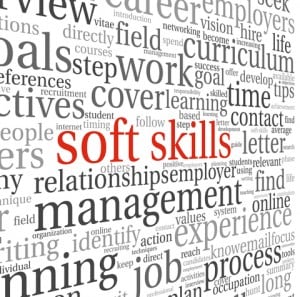Which of the following do you feel best defines the ‘gap’ in the US workforce skills gap?
- Lack of soft skills
- Lack of technical skills
- Lack of strong leadership skills
- Lack of computer-based technology skills
- NA – I don’t think there is a gap in the US workforce
 This is the question recently asked by Adecco Staffing in a telephone survey of 500 top executives.
This is the question recently asked by Adecco Staffing in a telephone survey of 500 top executives.
Disturbingly, 44% of those surveyed reported that the gap they most experience is in soft skills. Employees simply aren’t able to demonstrate sufficient communication, critical thinking, creativity, and collaboration to be optimally effective in their day-to-day work.
Another 14% shared their concern that the greatest gap exists in leadership (which I count among the soft skills.) That means that nearly half of the executives who participated in this study aren’t concerned about getting the technical dimensions of the job right; they’re worried about how employees and leaders interact with each other.
We can engage in a debate about why this is, which institutions have failed, and who’s to blame… or we can roll up our sleeves and explore what can be done.
- Are your hiring models skewed toward technical experience and expertise or some of the softer competencies that are harder to teach but vitally important to the job?
- Where are your training dollars spent? If you’re like most organizations, the money trail follows technical and job-specific needs, leaving woefully little for cultivating soft skills.
- How are your leaders selected and promoted? Shining the light on those who exemplify communication, collaboration, and leadership skills sends a strong message to others about what the organization values.
- Does your performance review process give as much attention to leadership and other soft skills as to the technical dimensions of the work?
- What gets rewarded – the results or how the results were achieved? Continuing to recognize bottom line results without an eye to the behaviors (and possible wake) behind them actively undermines a focus on soft skills and leadership.
For organizations looking to succeed in today’s hyper-competitive environment, it’s time to take a hard look at soft skills.
Image: www.dreamstime.com


Julie,
that was a great post. as above mentioned many professionals are mentioned that people are in organization lacking in soft skills based on US workforce skills gap, but unto my consideration people are lacking on their self confidence and they are not recognizing what is their ability to do anything. Yes i do agree that soft skills are very important to survive in any organization today’s world. but for this we cannot blame any one. because every teacher/university/institute teaches the same thing equally to every student, and it always depends on those students how they are learning and how importance they are giving for learning in their life’s. Ex: If we throw two balls towards a wall, one is with hole and another one is perfect. which one bounce back correctly? obviously the perfect ball without hole. my observation from students or juniors whom i am going across on my daily life is people are not concentrating on importance of future. If everyone value their respective future then there is no point of failure in any manner. even on above four points. Bottom Line: If we stop learning then we stop winning.
All the best
Thanks
Praveen
Thanks so much, Praveen, for this thoughtful response. You bring up several good points…
– Confidence – I agree that a lack of confidence can be really debilitating. As leaders and teachers, we need to help other realize and recognize their capacity and build the confidence they need to try new things, be resilient around set-backs and change. While confidence is not a gift we can bestow upon others, we can certainly take steps to help other bestow this gift upon themselves.
– Ownership – We all own our own development and learning. You’ are so right… we can’t blame this on others. Each of us must take the lead when it comes to pursuing the knowledge, experiences, skills, etc. that we need. Certainly organizations and supervisors can support this effort, but the ultimately responsibilities remains with the individual.
I love your last line… can I add to it? If we stop learning, we stop winning and we stop living!
Thanks so much for your support and wise input!
And that was amazing.. always a add on gives more value and weight to an content.
Thanks Julie